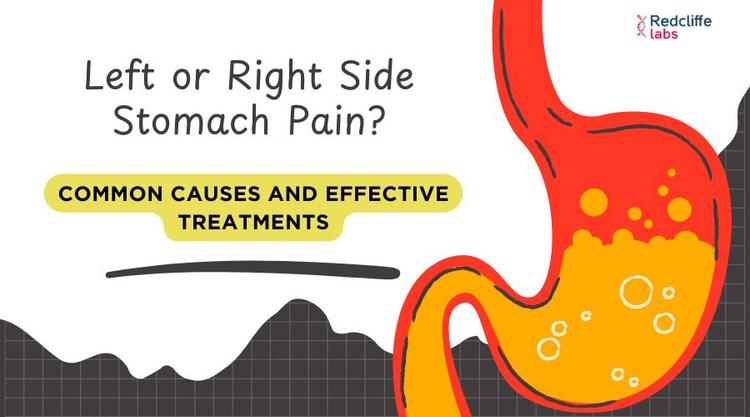Acid Peptic Disease: Causes, Symptoms, and Treatment

Medically Reviewed By
Dr. Geetanjali Gupta
Written By Sheena Mehta
on Nov 13, 2024
Last Edit Made By Sheena Mehta
on Jul 19, 2025

Did you know acid peptic disease exists?
Acid peptic disease (APD) is a digestive disorder characterized by dyspepsia. Its main symptom is pain in the middle of the upper abdomen or discomfort due to fullness, bloating, or nausea.
This blog is a complete guide to acid peptic disease, including its causes, symptoms, and treatment. Early and accurate diagnosis is necessary to ensure you are treating the right cause.
What is acid peptic disease?
Acid-related disorders characterized by the abnormal production of gastric acid are called acid peptic disease (APD). In other words, it is a condition that causes open sores or ulcers in the lining of the digestive tract.
The word “peptic” is derived from pepsin, a major digestive enzyme produced by the stomach. The components responsible for APD are gastric acid, pepsin, and the mucosal barrier.
What are the causes of acid peptic disease?
Acid peptic disease occurs due to the damage from acid and peptic activity in gastric secretion. These disorders affect the stomach, esophagus, and duodenum.
The main causes of acid peptic disease are as follows:
- Helicobacter pylori indicates infection with H. pylori, contributing to more than 60 percent of all gastric and duodenal ulcers.
- NSAIDs: Aspirin and diclofenac are non-steroidal anti-inflammatory drugs (NSAIDs) that can irritate the stomach.
- Alcohol and smoking: These habits are dangerous for health and can instantly lead to acid production.
- Steroids and other medicines: Drugs such as niacin, NSIADs, corticosteroids, etc., can increase the production of ulcers and make it worse, too.
- Blood group O. Regretfully, people with blood group O+ are at a higher risk of developing stomach ulcers.
- Heredity. A family history of peptic disease plays a crucial role. Those individuals are at a higher risk of developing peptic ulcers who already have a heredity of the same.
- Diet. If your diet lacks fiber and you consume a lot of caffeinated drinks and fried foods, this leads to an increase in these conditions.
- Stress: Not directly, but indirectly, stress does increase the symptoms of acid peptic disease.
- Diseases: Conditions such as chronic liver and kidney diseases, Zollinger-Ellison syndrome, etc., can create peptic ulcers.
What are the signs and symptoms of acid peptic disease?
Regretfully, the signs and symptoms of acid peptic disease (APD) are not visible in the first place. However, epigastric pain is the most common symptom that people complain about, which means pain in the central upper abdominal area and indigestion.
The most common symptoms of acid peptic disease (APD) include:
- Dyspepsia: This condition indicates pain or discomfort in the upper abdomen
- Heartburn: This condition indicates a burning sensation in the chest. This is due to acid reflux in the stomach.
- Nausea and vomiting generally happen after meals or when resting.
- Regurgitation: This condition indicates a sour taste in the mouth. It is a possible symptom of chronic acid reflux (GERD).
- Belching and bloating: These conditions arise from swallowed air accumulating in the stomach.
- Weight loss occurs in the case of severe acid peptic disease.
- Dark stools are a sign of a disorder in the digestive tract. You may experience black or tarry stools and bleeding ranging from mild to severe.
- Difficulty swallowing: Esophageal structures and irritation can cause swallowing difficulties.
What are the symptoms of complications?
As stated above, sometimes symptoms related to peptic ulcer disease do not show up quickly and begin to appear when there are complications. Therefore, symptoms of complications related to untreated ulcers include:
- Fever and chills
- Abdominal swelling
- Loss of appetite
- Loss of bowel movements and constipation
- Rapid heart rate
- Coagulated blood in your stomach
- Paleness or loss of color.
What are the different types of acid peptic ulcers?
Below are different types of acid peptic ulcers. Have a look!
- Duodenal ulcers: These types of ulcers constitute 80% of peptic ulcers and occur in the absence of H. pylori bacteria.
- Stomach ulcers contribute to almost 20% of peptic ulcers and are usually caused by H. pylori bacteria or non-steroidal anti-inflammatory drugs.
- Esophageal ulcers are painful and located in the lining of the lower part of the esophagus. They are not cancerous and are often caused by gastroesophageal reflux disease.
- Jejunal ulcers are also caused by H. pylori bacteria and are often linked to the development of gastric surgery. They are also called stomach ulcers, anastomotic ulcers, or marginal ulcers.
Note: Consult your doctor if experiencing these symptoms for proper diagnosis and treatment.
What is the treatment for acid peptic disease?
The treatment for acid peptic disease (APD) involves a combination of medicines, dietary changes, and lifestyle modifications. Let’s discover them in detail.
- Proton Pump Inhibitors (PPIs): These medications help reduce stomach production, contributing to ulcer healing. Examples include esomeprazole, lansoprazole, or omeprazole.
- H2 blockers: For instance, famotidine and ranitidine reduce stomach acid production, providing relief from chronic symptoms.
- Antacids: Over-the-counter medicines offer instant relief from the pain.
- H. pylori eradication: The combination of antibiotics with PPIs and other medicines treat infections caused by Helicobacter pylori.
- Lifestyle modification: These include avoiding smoking, drinking, spicy foods, caffeinated products, and excess weight can lead to symptoms, including GERD.
- Managing stress: Yoga, meditation, and exercises can help manage stress.
- Regular monitoring is important to manage chronic conditions.
- Avoiding NSAIDs: Avoiding or reducing the consumption of non-steroidal anti-inflammatory drugs can minimize the risk of stomach ulcers and bleeding.
- Sleeping on an inclined bed helps reduce symptoms of gastroesophageal reflux.
Also Read: https://redcliffelabs.com/myhealth/food-and-nutrition/25-healthy-high-fiber-snacks-for-weight-loss/
Conclusion
Do not ignore and address acid peptic disease to maintain digestive health. Talk to your medical professional if you are experiencing any signs and symptoms related to the peptic disease for early and accurate diagnosis and management. Besides, regular monitoring is key to getting customized treatment plans, paving the way for a well-balanced life free of the burden of acid peptic disease.


